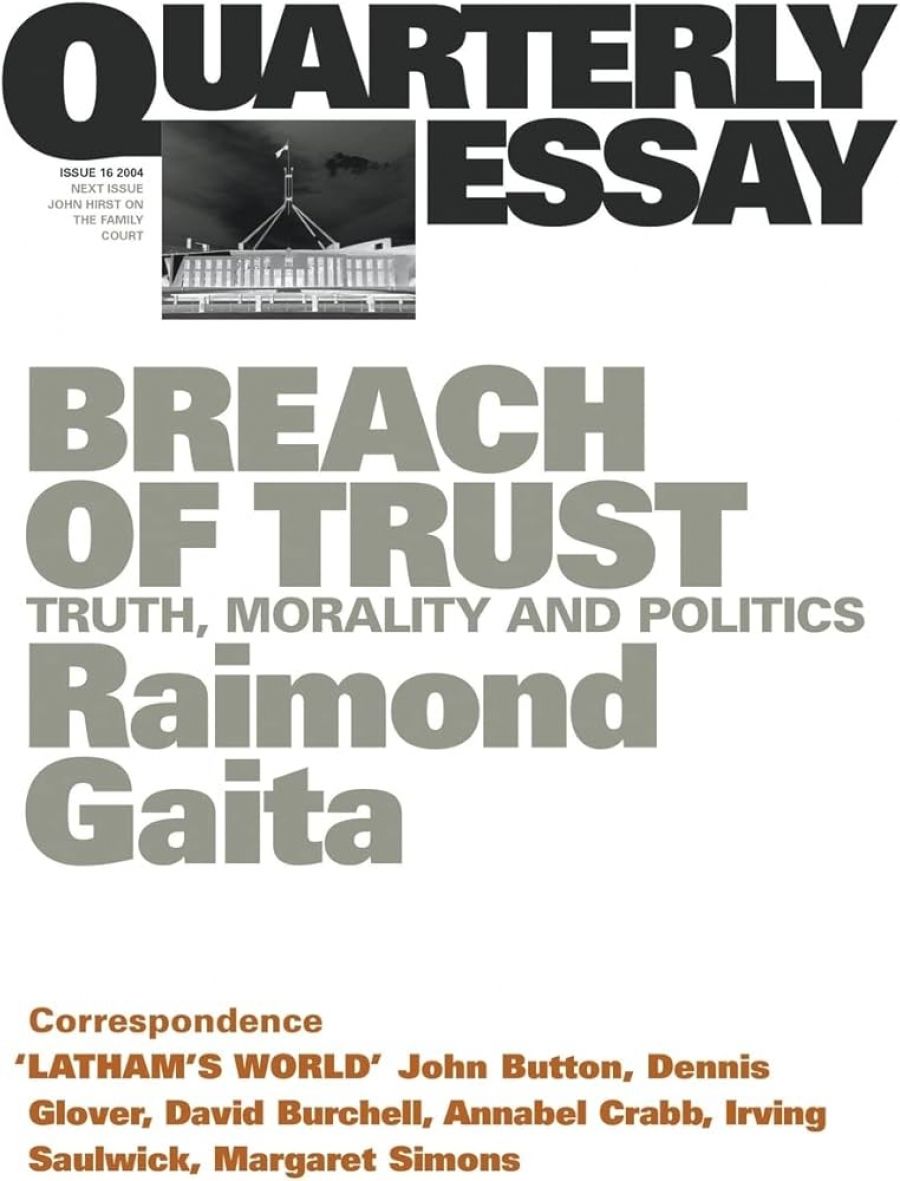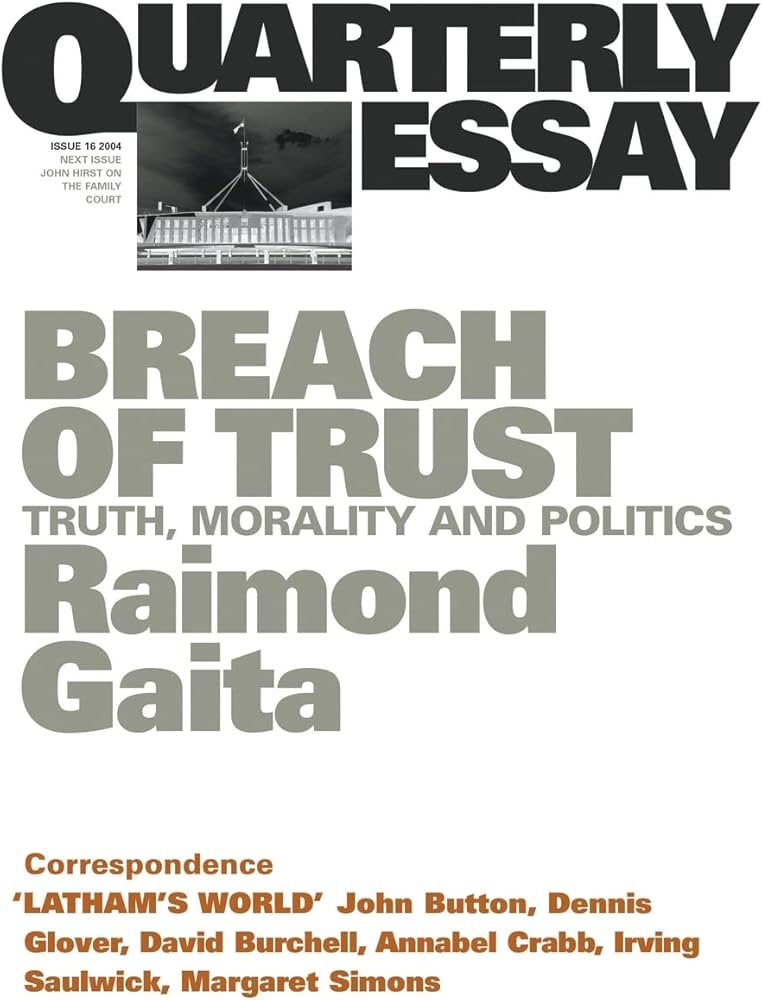
- Free Article: No
- Contents Category: Politics
- Review Article: Yes
- Article Title: Gaita-aid
- Online Only: No
- Custom Highlight Text:
On 15 February 2005 the Labor Opposition launched a ‘matter of public importance’ (MPI) debate on ‘truth in government’ in the House of Representatives. An MPI debate is really only an invitation to comment on a ‘matter for discussion’, with no vote taken, as would be the case in a censure motion. The parliamentary discussion is simply timed out. But it is a useful opposition tactic for getting arguments and evidence on the public record.
- Book 1 Title: Quarterly Essay 16
- Book 1 Subtitle: Breach of trust: truth, morality and politics
- Book 1 Biblio: Black Inc., $13.95pb, 103pp, 186395 229 2
- Book 1 Cover Small (400 x 600):

- Book 1 Cover (800 x 1200):

Kevin Rudd initiated this ‘discussion’, claiming that the real topic was ‘the death of accountability in government’, illustrated by the prime minister’s reluctance to accept responsibility for answering Opposition questions on defence and foreign policy. Carmen Lawrence participated as Labor’s other speaker, prosecuting the Opposition case by quoting from Raimond Gaita’s Quarterly Essay, Breach of Trust. Cynics be warned: not everything is permitted in politics. Lawrence was caught short by the acting Speaker, who took offence and interrupted Lawrence, protesting against her use of quotations from Gaita’s condemnation of the prime minister’s lies about the ‘children overboard’ affair. The acting Speaker asked Lawrence to withdraw the unparliamentary slur about lying. Lawrence tried to defend her conduct by saying that she was simply quoting. Good try, but not an acceptable defence in the eyes of the acting Speaker, who declared: ‘Even quoting you cannot accuse someone of lying.’ Lawrence cleverly confessed that she had no alternative but to ‘abandon the quote’. This statement of abandonment is now part of Lawrence’s speech in the Hansard, but cynics might be amused to find that the same Hansard record still contains the offending Gaita quotation as originally reported.
This parliamentary incident tells a larger tale about the wider community debate over trust in public life. Government speakers responded with plenty of alleged lies by Labor when in power. But the issue, as defined by Rudd and Lawrence, was not so much truth in politics as truth in government: the values of ‘government’ are more fundamental than those of ‘the government’. Where are defenders of truth in government getting their arguments? As this parliamentary debate shows, the Opposition is now taking Gaita-aid. We can only hope that they and other advocates of public truthfulness do justice to Gaita and adopt his broader philosophical perspective, rather than adapt his quotable account of ‘truth overboard’ to suit their own party-political interests.
What are Gaita’s broader perspectives? On reading Breach of Trust, we find a stinging attack on the ‘mendacity’ of John Howard, George W. Bush and Tony Blair: ‘the Christian triumvirate.’ Lying is not Gaita’s main complaint. Indeed, he flatters the political class by accepting that the burdens of public office might excuse some instances of lying. Affairs of state have their appropriate ‘reasons of state’, explained by Gaita in terms that reveal his hard-nosed recognition that, from time to time, even highly principled political leaders will have understandable, perhaps even compelling, reasons for being less than truthful. ‘It is obvious that politicians must sometimes lie and be in other ways deliberately untruthful, denying people the truth and sometimes deliberately leading them into error.’ Conscientious ‘politicians must sometimes do what morally they must not do’.
Gaita is thus quite realistic, as his appreciation of the hard truths of political ethics shows. He is no soft-left pushover in what The Australian calls ‘the Howard-hating commentariat’. Gaita indicates his independent mettle by taking on not just Paul Kelly but also Henry Reynolds. Gaita’s unusual defence of political lying serves not to excuse the current crop of leaders but to contrast the real world of high politics – where lying need not illustrate mendacity – with the current world of low politics with its ‘brazen mendaciousness’.
Gaita’s supporters will be touched by his engaging personality as a writer who can tease out an ethic of common humanity from aspects of his family history and many personal experiences. His antagonists, of course, will regard this as self-indulgent and opinionated. The challenge Gaita has set himself is to relate his personal political opinions to a larger normative framework. Between attacks on such misguided perspectives as tolerant consequentialism and intolerant ‘judgmentalism’, Gaita reveals an older alternative that he traces back to Socrates. The passages on Socratic political speech stand out as models of the sort of ‘humanly engaged understanding’ Gaita finds missing in contemporary political analysis. Gaita steps forward as our needed, but probably unwanted, Socratic gadfly.
What is Gaita’s standard for public trust? He argues that to ‘trust someone, you must do more than believe him. You must believe in him. You must believe that he is essentially truthful.’ The real problem under examination here is not so much political lying but lying about trust, or, more precisely, the political manipulation of public trust. Gaita’s case against ‘systematically mendacious’ political conduct is that it corrupts public trust in government through the very preoccupation with keeping the people onside. Mendacity here means systematic dishonesty driven by love of convenience or self-interest ahead of Gaita’s arresting image of political honesty: ‘love of country’, in the sense of being prepared to talk straight about its strengths and weaknesses.
Gaita is a distinguished philosopher, and Breach of Trust is an exercise in applied ethics. Well after ‘the Christian triumvirate’ has gone, this essay will continue to teach readers that ‘political ethics’ is not so much about the regulatory restraint of bad conduct by powerful people as about the promotion of the right way of life for those holding, or wanting to hold, public power.


Comments powered by CComment